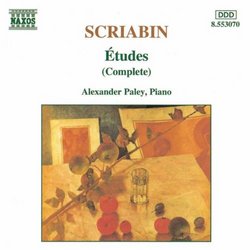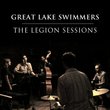| All Artists: Alexander Scriabin, Alexander Paley Title: Scriabin: Études (Complete) Members Wishing: 1 Total Copies: 0 Label: Naxos Release Date: 6/10/1997 Genre: Classical Styles: Historical Periods, Modern, 20th, & 21st Century Number of Discs: 1 SwapaCD Credits: 1 UPC: 730099407021 |
Search - Alexander Scriabin, Alexander Paley :: Scriabin: Études (Complete)
 | Alexander Scriabin, Alexander Paley Scriabin: Études (Complete) Genre: Classical
|
Larger Image |
CD DetailsSimilar CDs
|
CD ReviewsSkryabin, a hinge between two ages Shooshie | Dallas, TX USA | 06/13/2002 (3 out of 5 stars) "The world was changing fast. Composers were catching up with the limits of tonality, but Skryabin was pointing a way to an almost contrapuntal, modern, overlapping, layered tonality that--like Bach--didn't work if you looked at it in vertical freeze-frame, but only worked in motion. Most of his harmonic progression was very traditional, the cadences simply never reached what the ears expected at the time they expected it. When this finger arrives at the note, those fingers are already on to something else. He hit the limit and careened off into a sonic landscape as foreign as the theories of science of his time (1890s-1910s), but unlike many of the more theoretical composers, his was based on an intense emotional perception, and it worked even when you did not "understand" it. There is much to be learned from S. as we approach the centenary of his later works, but few are exploring him. Paley should be commended for doing so, and I recommend his CD. If for no other reason, it should be in everyone's library as historical reference for where Russian (and all Western) music had arrived before Soviet politics completely reshaped the Czar's culture into Tractor Sonatas, Factory Fugues, and Welder Waltzes. (ok, Shostakovitch was great, but... never mind) In Skryabin, we can hear not only the intelligently and beautifully maxed-out evolution of Chopin, but also the anticipation of what would later be some light-hearted Hollywood styles. Indeed, many of the early Hollywood composers were Russian emigres. Just as has happened in the past 100 years, this music broke free of many tonal restrictions, but remained tonal to the ears. S's Etudes are often simple, childlike tunes laid in a swirling stream of notes within which each line had a destiny of its own, and somehow they all worked together. Prokofiev's interplay between the hands often recalls Skryabin's stream-of-consciousness approach, though their styles are very different. I think it's safe to say that Skryabin anticipated and directly influenced the non-Soviet composers who followed and refused to go into 12-tone cycles and experimental atonality. The tonal world dove off the deep end and came up... in Hollywood, New York, London, in the theaters and on the radio. Play with the tempos of these etudes, and you can hear that end antipicated in the 13th chord progressions and harmonies that even resemble jazz, if you can picture it in Czarist Russia expressing the serious humanity of Tolstoy and Akhmatova.Personally, I find Paley's performance of these etudes to be erratic. Spend decades on these etudes trying to divine their soul, and you will find there are many ways you can approach each one of them. Paley's performances are workable, and sometimes inspiring, but some of these etudes are simply devilishly difficult; they don't always lend themselves, physically, to what the ear may imagine. Many performers thusly pick only a handful to record. To play them as Skryabin probably intended them would be a superhuman feat, one which Skryabin himself no doubt covered up with pedalling from time to time, as did Horowitz and others. But Paley's approach seems to be an accordionlike variable tempo, squeezing the tempo when the sailing is more smooth, almost stopping it in the most difficult passages. Perhaps that is simply the way Paley hears it, but I can't imagine Skryabin hearing it that way. Yes, lots of rubato, but not THIS much! If you're a pianist, please buy the sheet music to go along with this, and try it yourself. You may see what I mean, or you may go with Paley, but you'll agree in the end: these are difficult works to play well. Paley plays them; some of them he plays extremely, beautifully well. Others are at least there for the historical record. The fact that Paley undertook a "complete" survey took guts and bravery, as well as a huge talent. As difficult as it is to find any recordings of S., this is a good thing. Buy these. They are not the last word on the subject, but they are a desperately needed step on the evolution of a genuine Skryabin style. I hope Paley rerecords them in about ten years, in his late fifties, so we can hear where he has arrived with them.Shooshie" Pale detail Paul Geffen | 03/07/2001 (3 out of 5 stars) "The Scriabin Etudes are his opus numbers 8, 42, 65, plus opus 2 #1, opus 49 #1, and opus 56 #4. They come from all phases of his composing career and are worthy of comparison with the Etudes of Scriabin's predecessors, Chopin and Liszt. Like the Etudes of Chopin and Liszt, these works are technically very demanding, but Scriabin is not so much concerned with the development and display of specific aspects of technique as with exploring a range of moods and colors.Alexander Paley, who was born in Moldavia in 1956, brings to these varied works a calm and even-tempered approach. Although these are certainly virtuoso showpieces, Paley does not use this opportunity to show off. These are inner-directed and contemplative performances. This is not to fault his technique in any way - the demands of the music are surely met and dealt with. It is, however, in definite contrast to other artists who have recorded these works; for example, Vladimir Horowitz, who uses this material in a more self-indulgent manner.Complete recorded sets of the Scriabin Etudes are hard if not impossible to find. Richter has recorded some of the opus 42, Morton Estrin the complete opus 42, and many other pianists including the composer have recorded excerpts. The Scriabin recording is currently on a Harmonia Mundi compact disc entitled "Scriabine and the Scriabinians" and the sound quality suggests that this could be a piano roll and not an acoustic recording from 1910. Scriabin's presentation of his opus 8 number 12 is one long stream of notes, a rush, a flood, a surrender to a wave of sound. No other performer treats the music in quite this way. The notes themselves seem secondary, sacrificed to a larger scheme in masses of sonority. Richter, Demidenko, and others all tend to articulate more clearly and so avoid this evocative blurring of detail. Paley comes closer to Scriabin's sound than do the Russians, and while his performance does not have the reckless energy of the original he does seem to find the feelings between the notes.The sound of this release is basically very good, and although I find it somewhat dull and recessed, others will hear a rich, warm tone and plenty of ambience.This recording is valuable and enjoyable and is recommended warmly." Scriabin Etudes Erik D. Lofquist | Shoreline, WA | 06/18/2000 (4 out of 5 stars) "This is a much-needed addition to the woefully small catalogue of Scriabin recordings. The Etudes are presented in chronological order, which makes it convenient to track Scriabin's development as a composer (the Etudes span almost the whole range of his career). The performer, Alexander Paley, has become known as a definitive perfomer of the Russian repertoire and this disc illustrates why. He is technically brilliant (good thing, for these pieces!), but I sometimes find his style to be needlessly aggressive, which makes this a difficult disc to listen to straight-through. That is a minor quibble, however. Any fan of classical piano needs this disc."
|

 Track Listings (26) - Disc #1
Track Listings (26) - Disc #1

